When it comes to building muscle, gym machines can be an excellent supplement or even a primary tool for achieving significant strength and size gains. While many fitness enthusiasts favor free weights, muscle-building machines offer numerous benefits, particularly for those looking to isolate specific muscles or who are new to lifting.
Machines provide guided resistance, which reduces the risk of injury by controlling your range of motion. They also help you maintain proper form throughout each exercise, allowing you to focus purely on strength and hypertrophy. Additionally, muscle-building machines enable you to lift heavier weights more safely, as you don’t need to worry about balance or stabilization as much as you do with free weights.
Machines are not only for beginners—they’re valuable tools for advanced lifters too. For example, they allow you to push your muscles to failure without the same risk of injury that could come with free weights. They also make it easier to implement advanced techniques like drop sets, supersets, or eccentric-focused reps. Moreover, when combined with free weights, machines can help you target muscle imbalances or recover from injuries by providing safer, controlled movements.
Whether you’re focusing on strength, hypertrophy, or rehabilitation, using gym machines efficiently can help you reach your fitness goals faster. The following list covers 10 essential muscle-building machines that you should incorporate into your routine. Each machine targets key muscle groups and offers specific benefits to help you maximize muscle growth.
With proper form and a clear understanding of how these machines can be used, you can significantly enhance your workout regimen. Let’s dive into the must-use gym machines for building serious muscle.
Leg Press Machine
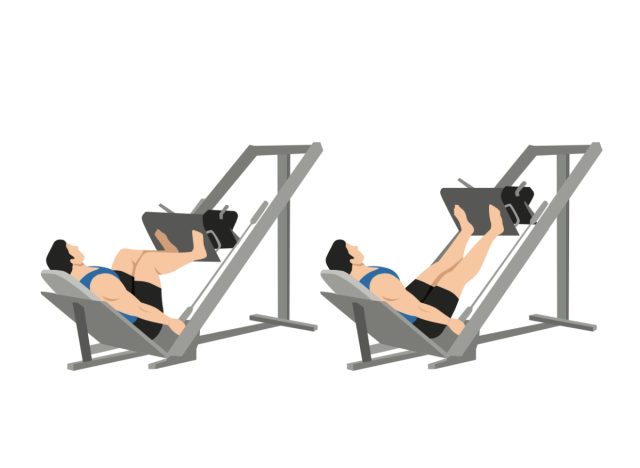
The leg press machine is a fantastic tool for building lower-body strength, specifically targeting the quadriceps, hamstrings, and glutes. Unlike squats, where you must stabilize the weight and balance your body, the leg press lets you focus entirely on driving through your legs. This can be a huge advantage for those with lower back or knee issues, as the machine offers a more controlled environment while still allowing you to lift heavy weights and stimulate muscle growth.
How To Use It:
- Sit in the machine with your back flat against the pad and place your feet about shoulder-width apart on the platform.
- Extend your legs to push the platform away, but do not lock your knees at the top of the movement.
- Slowly lower the weight back down, allowing your knees to bend at about a 90-degree angle.
- Keep the movement controlled throughout and ensure that your knees are tracking in line with your toes to prevent injury.
Trainer Tip: Vary your foot placement on the platform to target different areas of your legs. A higher foot placement emphasizes the glutes and hamstrings, while a lower position focuses more on the quads. Make sure to keep your back pressed against the pad throughout the movement to protect your lower back and get the most out of the exercise.
Lat Pulldown Machine
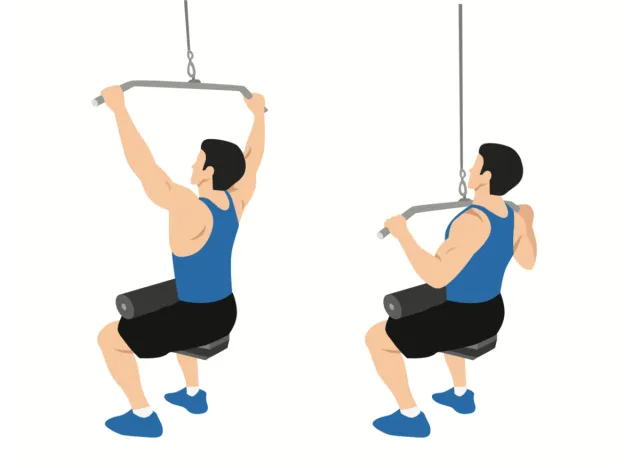

The lat pulldown machine is an essential piece of equipment for anyone looking to build a wide, strong back. This machine specifically targets the latissimus dorsi muscles, which run along the sides of your back and give your torso that coveted V-shape. In addition to working the lats, the lat pulldown also engages the biceps, rhomboids, and trapezius muscles, making it a great overall upper-body exercise.
How To Use It:
- Sit with your knees secured under the pad and grip the bar with your hands slightly wider than shoulder-width apart.
- As you pull the bar down toward your chest, focus on engaging your back muscles and keep your elbows pointed down and back.
- Once the bar reaches the top of your chest, pause and squeeze your shoulder blades together before slowly returning the bar to the starting position.
Trainer Tip: Be mindful of your form and avoid pulling the bar behind your head, as this can place unnecessary strain on your neck and shoulders. Instead, pull the bar in front of your chest for a safer and more effective movement. To further increase muscle activation, slow down the negative (lowering) portion of the exercise and fully stretch your lats at the top of each rep.
Seated Chest Press Machine
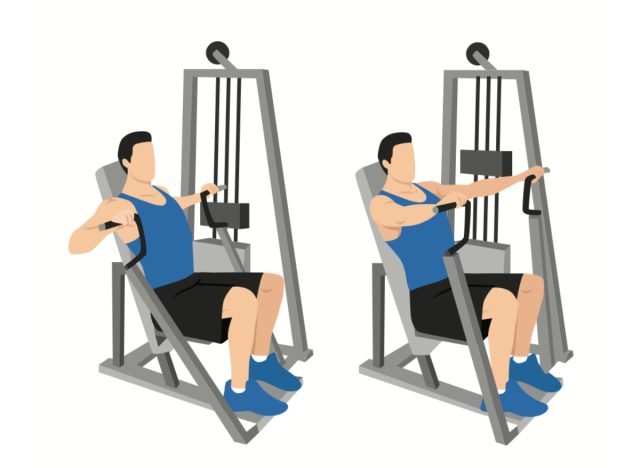

The seated chest press machine is an excellent way to target your chest, shoulders, and triceps, while ensuring proper form and safety throughout the movement. Unlike free-weight bench presses, which require stabilizing muscles and perfect technique, the chest press machine offers a guided path, reducing the risk of injury and making it easier to lift heavier weights. This machine is particularly useful for isolating the chest muscles, which can help build mass and definition in the pectorals.
How To Use It:
- Adjust the seat so that the handles are level with the middle of your chest.
- Grip the handles and press them forward until your arms are fully extended, but avoid locking your elbows.
- As you return to the starting position, focus on feeling the stretch in your chest muscles while keeping control of the weight.
- Maintaining a steady pace throughout the movement will help maximize muscle engagement and prevent injury.
Trainer Tip: To get the most out of the chest press, keep your back flat against the pad and retract your shoulder blades before starting the exercise. This will help to isolate your chest and reduce strain on your shoulders. Also, focus on controlling the weight throughout the entire range of motion, especially on the way down, to maximize muscle tension and growth.
Smith Machine
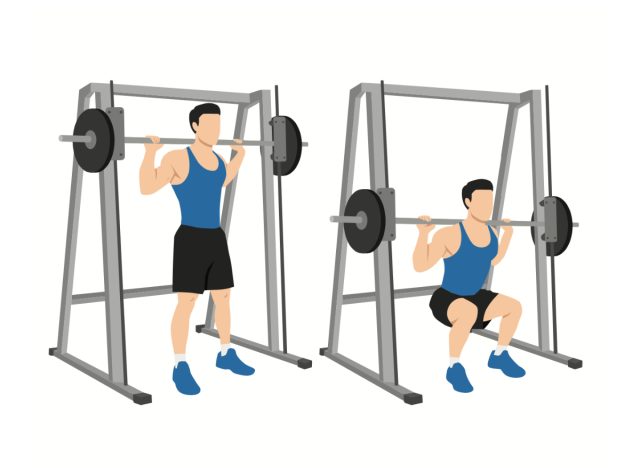

The Smith machine is a versatile piece of equipment that allows you to perform a wide variety of exercises, including squats, bench presses, lunges, and shoulder presses, with added safety. Since the barbell is fixed on a guided track, the machine helps you maintain balance and control throughout each movement. This makes the Smith machine particularly useful for those who want to lift heavier weights without worrying about losing balance or form.
How To Use It:
- When performing squats on the Smith machine, position the bar across your shoulders, and step your feet slightly in front of you.
- Squat down until your thighs are parallel to the ground.
- Push through your heels to return to the starting position.
- For bench presses, set the bench underneath the bar, lower the bar to your chest, and press it back up in a controlled manner.
Trainer Tip: While the Smith machine offers stability and safety, it’s important not to rely on it entirely. The guided path of the barbell can limit your natural range of motion, so make sure to incorporate free-weight movements into your routine for overall strength and functional fitness. That said, the Smith machine is a great tool for pushing past plateaus and performing advanced techniques like drop sets and partial reps.
Cable Machine
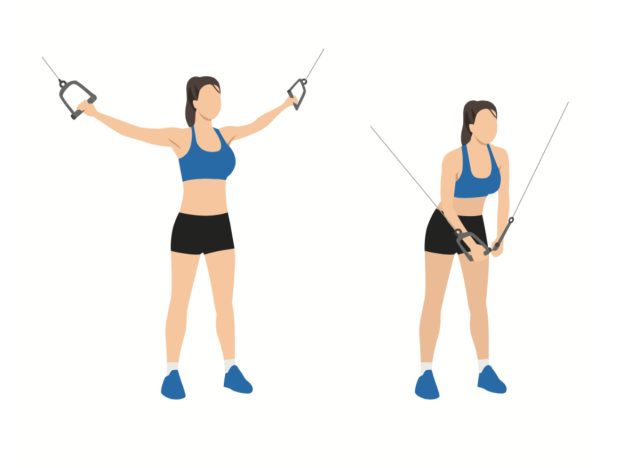

The cable machine is one of the most versatile pieces of equipment in the gym, allowing you to target virtually every muscle group from different angles. With adjustable pulleys and various attachments, you can use the cable machine for chest exercises, back rows, bicep curls, tricep pushdowns, and even leg exercises.
Unlike free weights, the constant tension provided by the cable machine keeps your muscles working throughout the entire movement, which can lead to better muscle engagement and growth. Cable exercises are often more joint-friendly as well, making them ideal for those with shoulder or elbow issues.
How To Use It:
- To perform a basic cable chest fly, position the pulleys at chest height, grab a handle in each hand, and step forward to create tension.
- With a slight bend in your elbows, bring your hands together in front of your chest.
- Slowly return to the starting position while maintaining control of the weight.
Trainer Tip: The key to maximizing the benefits of the cable machine is controlling the movement and maintaining tension on the muscles throughout the exercise. Avoid using momentum to move the weight, and instead, focus on slow, deliberate movements. This will not only increase muscle activation but also reduce the risk of injury.
Leg Curl Machine
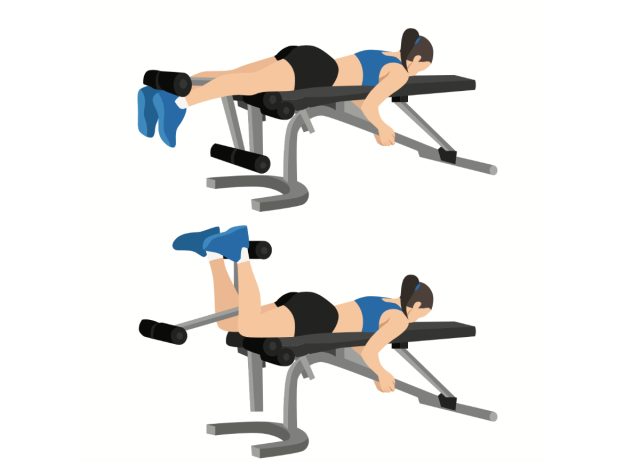

The leg curl machine is designed to isolate the hamstrings, which are often overlooked in favor of more quad-dominant exercises. Strong hamstrings are essential for balance, injury prevention, and overall leg development. This machine is particularly useful for strengthening the back of your legs and improving knee stability, which can help reduce the risk of injury during activities like running or jumping.
How To Use It:
- Lie face down with your ankles positioned under the roller pad.
- Curl your legs up toward your glutes, squeezing your hamstrings at the top of the movement.
- Slowly lower the weight back down.
- Focus on controlling the weight throughout the exercise to get the most out of each rep.
Trainer Tip: Pay attention to the tempo of your reps, especially the lowering phase, as this is where most muscle damage (and growth) occurs. Avoid rushing through the exercise, and focus on squeezing your hamstrings at the top of each rep to fully activate the muscle.
Pec Deck Machine
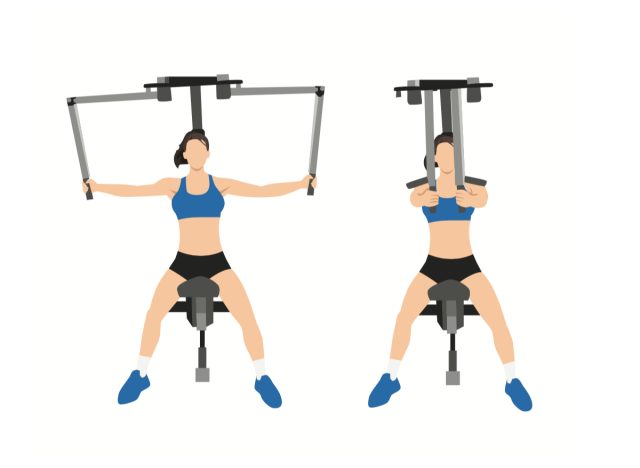

The pec deck machine is a fantastic tool for isolating your chest muscles, especially the pectoralis major, without needing to balance or stabilize the weight. This machine allows for a full range of motion in a controlled environment, making it an ideal exercise for those who want to add volume and definition to their chest without risking injury. Additionally, the pec deck is easier on the shoulders than free-weight flyes, making it a safer option for people with joint issues.
How To Use It:
- Sit with your back against the pad and adjust the seat height so that your elbows align with your chest.
- Grip the handles with your elbows bent at 90 degrees and slowly bring them together in front of your chest.
- Squeeze your chest muscles at the peak of the movement.
- Return to the starting position in a slow and controlled manner.
Trainer Tip: To maximize muscle engagement, focus on squeezing your chest muscles as you bring the handles together. Avoid using momentum to complete the reps, and instead, control the movement from start to finish. This will help you build muscle more effectively and protect your shoulders from unnecessary strain.
Leg Extension Machine
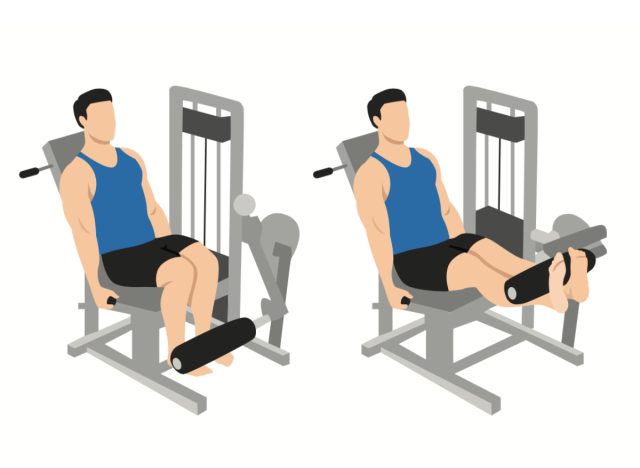

The leg extension machine is a staple for targeting the quadriceps, which are responsible for the bulk of the muscle in the front of your thighs. This exercise is highly effective for isolating the quads, helping to build size, definition, and strength. It’s especially beneficial at the end of a workout to fully exhaust the quads and maximize growth.
How To Use It:
- Sit with your back flat against the pad and position your ankles under the roller pad.
- Adjust the seat so your knees are aligned with the machine’s pivot point.
- From here, extend your legs by pushing the roller pad upward until your legs are straight but avoid locking your knees.
- Lower the weight back down in a slow, controlled manner, focusing on engaging your quadriceps throughout the entire movement.
Trainer Tip: Control the tempo, especially when lowering the weight, to maximize muscle activation. You can also adjust the range of motion to target different portions of the quad—stopping just short of fully extended can help protect the knee joints while still building strength and muscle. Always be cautious with the amount of weight used on the leg extension machine, as going too heavy can put excessive strain on your knees.
Chest Fly Machine
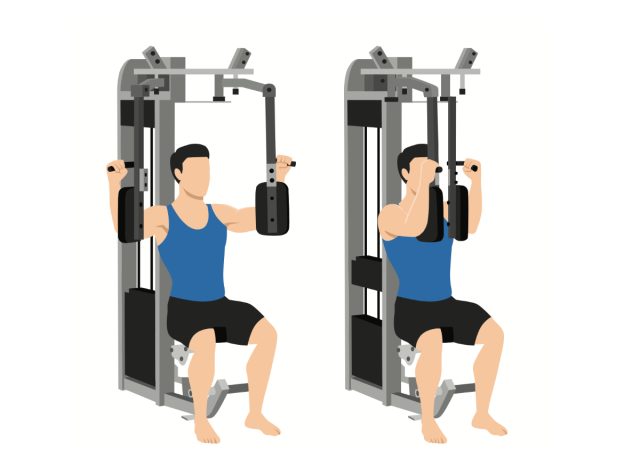

The chest fly machine is designed to isolate the pectoral muscles, offering a safe, guided motion to target the chest without the need for a spotter. This machine focuses specifically on stretching and contracting the chest, which helps build muscle mass and definition in the pectorals.
The guided nature of the machine makes it ideal for both beginners and experienced lifters who want to concentrate on their chest muscles without worrying about form or stabilization issues. Since the machine assists with balance, you can focus entirely on the range of motion and muscle engagement for maximum hypertrophy.
How To Use It:
- Sit with your back firmly against the pad and grip the handles with a slight bend in your elbows.
- Slowly bring the handles together in front of your chest, squeezing the chest muscles at the peak of the movement.
- Gradually return the handles to the starting position, maintaining tension in the chest throughout the range of motion.
Trainer Tip: For maximum benefit, avoid letting the handles come together too quickly. Slower reps allow for better control, which results in increased muscle tension and improved chest activation. Aim to keep a slight bend in the elbows throughout the movement to protect your shoulder joints and ensure the emphasis remains on your chest muscles. Perform this exercise as the last in your chest routine to really exhaust the muscle fibers and enhance growth.
Seated Row Machine
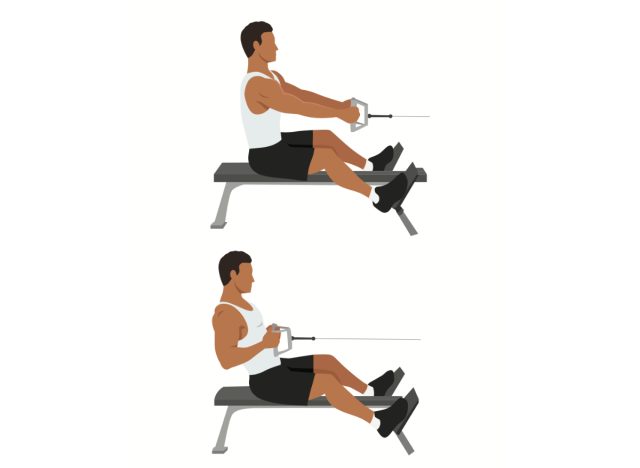

The seated row machine is an excellent way to strengthen your back, particularly the middle back muscles like the rhomboids and trapezius. It also engages the biceps and rear deltoids, making it a comprehensive upper-body exercise that promotes overall muscle balance and stability.
The seated row machine is especially beneficial for correcting posture, as it helps pull the shoulders back, countering the forward hunch many people develop from long hours of sitting. By using this machine, you can focus on building a strong, wide back, which contributes to a well-rounded physique.
How To Use It:
- Sit with your feet braced against the platform and grip the handles.
- Pull the handles toward your torso, keeping your back straight and focusing on engaging your back muscles as you squeeze your shoulder blades together.
- Be sure to keep your elbows close to your sides throughout the movement.
Trainer Tip: Avoid using momentum by pulling too quickly—this diminishes muscle engagement and can lead to strain or injury. Instead, control the weight on both the pull and release portions of the movement. Pause for a brief second at the top of the movement to ensure your shoulder blades are fully contracted, which will maximize back muscle activation. For added intensity, try different grip variations (neutral, underhand, or wide grip) to target different areas of the back.





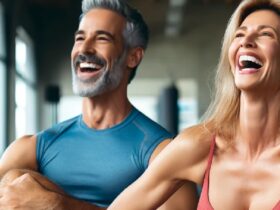
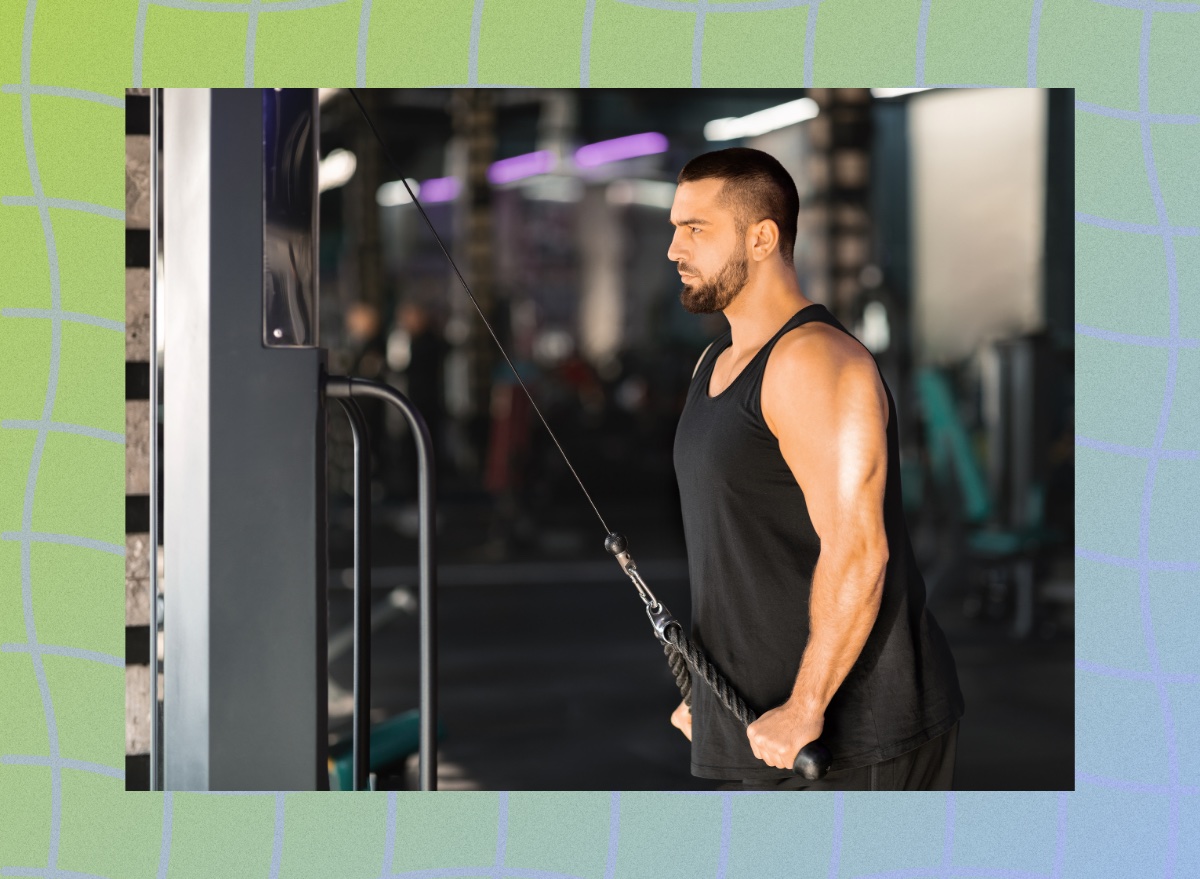




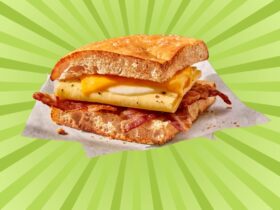


Leave a Reply